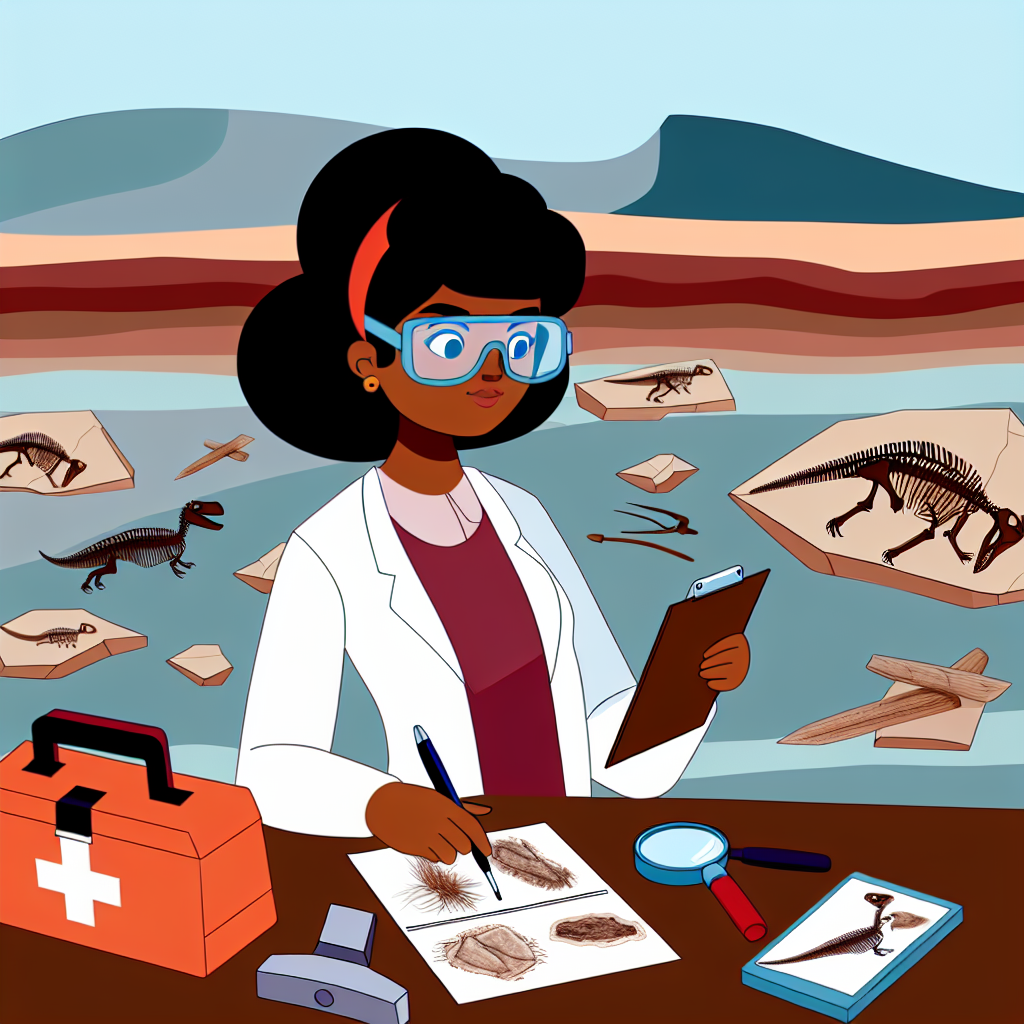Introduction:
A paleontologist studies the history of life on Earth through fossils.
Their work helps us understand Earth’s past.
Fieldwork:
Paleontologists often conduct fieldwork to excavate fossils from different geological formations and locations.
Laboratory Work:
Back in the lab, paleontologists clean, analyze, and categorize fossils.
This work helps them gain insights into ancient ecosystems.
Research and Analysis:
They conduct research to interpret the data gathered from fossils.
This contributes to scientific knowledge about evolution.
Collaboration:
Paleontologists collaborate with geologists, biologists, and other scientists.
This collaboration helps piece together Earth’s history accurately.
Publication and Communication:
They write research papers and give presentations.
Additionally, they engage with the public to share their findings.
Teaching and Outreach:
Many paleontologists also teach at universities, museums, and schools.
Their goal is to inspire the next generation of scientists.
Field Trips and Exhibits:
They may lead field trips and organize exhibits.
Furthermore, they participate in public outreach events.
Continuing Education:
Paleontologists stay updated on the latest techniques.
They attend conferences, workshops, and ongoing learning opportunities.
Conservation and Ethics:
They advocate for the protection of fossil sites.
Additionally, they promote ethical collecting practices.
Education and Training:
To become a paleontologist, you typically need a minimum of a Bachelor’s degree in a relevant field such as geology, paleontology, biology, or earth sciences.
Transform Your Career Today
Unlock a personalized career strategy that drives real results. Get tailored advice and a roadmap designed just for you.
Start NowSome paleontologists may pursue advanced degrees such as a Master’s or PhD to further specialize in their area of interest.
Fieldwork experience is crucial for paleontologists to gain hands-on experience in excavating fossils and analyzing geological formations.
Many aspiring paleontologists participate in internships or volunteer opportunities with museums, research institutions, or government agencies to gain practical experience.
Continuing education is essential for paleontologists to stay current with advancements in the field, new research techniques, and technological innovations.
Paleontologists often attend conferences, workshops, and seminars to expand their knowledge and network with other professionals in the field.
Job Responsibilities:
Conducting field research to discover fossils and artifacts.
Using tools and technology to excavate and analyze findings.
Collaborating with other researchers and scientists to study prehistoric life.
Conducting Field Research:
Paleontologists spend a significant amount of their time conducting field research.
This involves traveling to various locations known for fossil-rich deposits.
In the field, paleontologists use tools like brushes, picks, and shovels.
They carefully excavate fossils from the earth.
Excavation and Analysis:
Once fossils are unearthed, paleontologists delicately transport them to their lab.
In the lab, they use advanced technology such as CT scanners and microscopes.
This helps paleontologists study the fossils in detail.
Such analysis provides insights into the biology and behavior of ancient creatures.
Collaboration with Researchers:
Paleontology is a collaborative field.
Paleontologists often work closely with other researchers and scientists.
By sharing their findings and expertise, they enhance understanding of prehistoric life.
Showcase Your Business Today
Reach thousands of readers actively exploring professional services. Publish your business profile and grow your audience now.
Publish NowCollaboration leads to the exchange of ideas, ensuring more comprehensive research outcomes.
Delve into the Subject: Technological Advances Impacting Zoology Research
Data Collection and Analysis:
As a paleontologist, one of the main responsibilities involves documenting and cataloging fossils and samples.
This meticulous process is crucial for the accurate preservation and study of ancient life forms.
Paleontologists spend a significant amount of time conducting laboratory tests and experiments on the collected fossils and samples.
These experiments help in understanding the composition, structure, and characteristics of the fossils.
This provides valuable insights into the past life forms.
After collecting data from various experiments, paleontologists engage in interpreting the data.
This understanding helps them to reconstruct the ancient habitats, climate conditions, and biodiversity.
By documenting and cataloging fossils and samples, paleontologists create a comprehensive record of ancient life forms.
This data is essential for researchers to study evolution, extinction events, and the interconnections between different species.
Laboratory tests and experiments play a crucial role in the analysis of fossils and samples.
Using various techniques such as microscopy, chemical analysis, and dating methods allows paleontologists to extract detailed information about the specimens.
Interpreting data obtained from experiments is a challenging yet rewarding task for paleontologists.
It requires a deep understanding of geological and biological processes to reconstruct past environments accurately.
Understanding past environments and ecosystems is essential for paleontologists to draw connections between different species and their habitats.
By reconstructing ancient ecosystems, researchers can piece together the intricate web of life that existed millions of years ago.
Explore Further: Public Outreach: Educating the Community about Zoology
4. Publication and Communication:
As a paleontologist, one of the key responsibilities is to communicate research findings effectively.
This involves:
- Writing research papers and articles for academic journals: Paleontologists spend a significant amount of time writing detailed research papers that document their findings and contribute to the scientific community.
- Presenting findings at conferences and lectures: Paleontologists often present their research at conferences, symposiums, and academic lectures to share their discoveries with other experts in the field.
- Educating the public through outreach programs and museum exhibits: Paleontologists play a crucial role in educating the public about prehistoric life through outreach programs, museum exhibits, and public lectures.
Effective communication is essential in paleontology as it helps in disseminating knowledge, promoting new discoveries, and engaging with a wider audience.
See Related Content: Wildlife Rehabilitation: Role of Zoologists in Recovery
Travel and Fieldwork
As a paleontologist, one of the most exciting and daring aspects of the job is spending time in remote locations to search for fossils.
This involves embarking on challenging expeditions to unearth remnants of ancient life forms.
These excursions can take you to the most remote corners of the earth, where civilization is sparse, and nature is untamed.
Enduring harsh weather conditions and physical demands is a daily reality for paleontologists during fieldwork.
Whether trekking through scorching deserts under the blazing sun or battling freezing temperatures in icy tundras, the job requires resilience and adaptability.
The ability to withstand the elements and push through physical challenges is crucial in the quest for uncovering fossil treasures.
Working with local communities and landowners is an integral part of a paleontologist’s fieldwork.
Building relationships with these groups is essential for gaining access to prime fossil sites.
Ensuring smooth operations during excavations is another key factor.
Collaborating with locals also helps in understanding the area’s history, geography, and ecosystem.
This knowledge provides valuable insights that can aid in fossil discovery.
Gain More Insights: Animal Behavior Studies: Insights from Zoologists

Specializations within Paleontology:
Paleontologists can focus on various specializations within the field.
These specializations allow them to explore specific areas deeply.
Each area contributes to the overall body of knowledge.
- Paleobotanists study ancient plant life.
- Vertebrate paleontologists focus on prehistoric animals.
- Micropaleontologists analyze microscopic fossils.
Paleobotanists specialize in the study of ancient plant life.
They examine fossilized plants to understand evolution.
This helps reconstruct ancient ecosystems over geological periods.
Showcase Your Business Today
Reach thousands of readers actively exploring professional services. Publish your business profile and grow your audience now.
Publish NowVertebrate paleontologists study prehistoric animals with backbones.
They analyze fossilized remains to understand anatomy and behavior.
This includes discovering new species and reconstructing ecosystems.
Micropaleontologists specialize in the analysis of microscopic fossils.
These fossils provide insights into past climate conditions.
By studying microfossils, they enhance our understanding of Earth’s history.
Each specialization offers unique research opportunities.
Collaboration among paleontologists leads to a comprehensive understanding.
The diverse specializations demonstrate the field’s complexity.
This highlights the importance of interdisciplinary approaches.
Challenges and Rewards:
Being a paleontologist comes with its fair share of challenges and rewards.
Let’s delve into some of the key aspects that professionals in this field face on a daily basis.
Challenges:
- Funding Constraints: One of the major challenges for paleontologists is securing funding for their research projects.
- Competition for Resources: In addition to funding constraints, paleontologists also face fierce competition for resources such as access to excavation sites.
- Fieldwork Challenges: Conducting fieldwork in remote locations can be physically demanding and challenging.
Rewards:
- Groundbreaking Discoveries: One of the most rewarding aspects of being a paleontologist is the opportunity to make groundbreaking discoveries.
- Contribution to Scientific Knowledge: Paleontologists play a crucial role in advancing our understanding of evolution and biodiversity.
- Work-Life Balance: Despite the challenges they face, many paleontologists find fulfillment in their work and are able to strike a balance.
Paleontologists play a vital role in unraveling the mysteries of the past.
They shape our understanding of the world around us.
Daily Responsibilities of a Paleontologist
Paleontologists study ancient life forms through fossils found in various locations worldwide.
They spend time in the field excavating fossils using specialized tools and techniques.
Paleontologists carefully document and label each fossil to keep track of their findings accurately.
Back in the lab, they clean, analyze, and classify fossils to understand the species they belonged to.
Often, they collaborate with other scientists to examine the geological context of their findings.
Paleontologists may also conduct research, publish papers, and present their discoveries at conferences.
They sometimes teach paleontology courses or give lectures to educate others about their field.
Additionally, they may work in museums to curate fossil collections or exhibit displays.
Additional Resources
Paleontology Research at the AMNH
University of California Museum of Paleontology
[E-Books for Sale]
The Big Book of 500 High-Paying Jobs in America: Unlock Your Earning Potential
$19.99 • 500 High-Paying Jobs • 330 pages
Explore 500 high-paying jobs in America and learn how to boost your career, earn more, and achieve success!
See All 500 High-Paying Jobs of this E-Book
1001 Professions Without a Degree: High-Paying American Jobs You Can Start Now
$19.99 • 1001 Professions Without a Degree • 174 pages
Discover 1001 high-paying jobs without a degree! Unlock career tips, skills, and success strategies for just $19.99!




